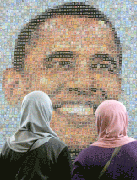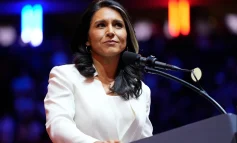WASHINGTON – The United States’ popularity in the Arab world has plummeted to levels lower than the last year of the George W. Bush administration, according to a new survey of public opinion in six Arab countries released here last Wednesday.
The “Arab Attitudes” survey found that favorable ratings of the United States have fallen by nine percent or more in Morocco, Egypt, Jordan, Saudi Arabia, and the United Arab Emirates (UAE) over the past two years.

|
| President Barack Obama during his last visit to Egypt. |
In Egypt, they fell from 30 percent to a meagre five percent. Only in Lebanon did positive views of the U.S. (23 percent) remain consistent.
Consisting of 4,000 face-to-face-interviews conducted by the Zogby International firm between mid-May and mid-June, the survey also found that 10 percent or less of Arabs in all the countries polled approve of President Barack Obama’s policies.
Obama’s favorable ratings were the lowest by far among the five national leaders covered in the survey. Turkish Prime Minister Recep Tayyip Erdogan and Saudi King Abdullah ibn Abdul Aziz were the most highly regarded of the five, who also included Iranian President Mahmoud Ahmadinejad and French President Nicholas Sarkozy.
The decline in the ratings for both the U.S. and Obama stems primarily from disappointment in the failure to meet the high expectations created by Obama’s election in 2008, according to James Zogby, the president of the Arab American Institute (AAI), which sponsored the annual survey.
Those expectations appeared to rise further after Obama’s June 2009 speech in Cairo, where he pledged to “seek a new beginning” between the U.S. and the Muslim world and expressed particular sympathy for the plight of the Palestinians.
“We are talking about expectations raised and expectations dashed,” said Zogby, author of the book “Arab Voices” whose brother, John, is the CEO of Zogby International.
“Obama didn’t create the problem [of anger at U.S. policies]. He created the expectations that the problem will be solved,” he explained.
Indeed, asked whether Obama met the expectations he set by the speech, an overwhelming majority of respondents in Morocco, Egypt, Lebanon, Jordan, and Saudi Arabia said he did not. A plurality of respondents in the UAE agreed with that assessment.
Besides the findings on attitudes toward the U.S. and Obama, the survey found that Arabs rank the “continuing [Israeli] occupation of Palestinian lands” and “U.S. interference in the Arab countries” as the greatest obstacles to peace and stability in the Middle East.
Asked to choose the single greatest obstacle to regional peace and stability from among five options, pluralities in Morocco (36 percent), Egypt (37 percent), and Jordan (49 percent) cited the Israeli occupation of Palestinian lands, followed closely by U.S. interference in the region.
Pluralities in Lebanon (50 percent) and the UAE (45 percent) cited U.S. interference as the greatest threat, while in Saudi Arabia, the Israeli occupation, U.S. interference, and “Iran’s interference in Arab affairs” were each cited by 26 percent of the respondents.
Asked about specific U.S. policies affecting the Middle East, majorities in all six countries said Obama’s handling of the Palestinian issue had worsened U.S.-Arab relations.
Opinions were also largely negative on the question of Obama’s efforts to engage the Muslim world.
“It is noteworthy that the two issues on which the administration has invested considerable energy – ‘the Palestinian issue’ and ‘engagement with the Muslim world’ – received the lowest approval ratings, less than nine percent across the board,” according to Zogby.
Opinions were more mixed with respect to three other issues – ending the Iraq war, establishing a no-fly zone over Libya, and efforts to stop Iran’s nuclear program – although there were variations among the countries.
In Saudi Arabia, for example, a whopping 84 percent of respondents said that the no-fly zone over Libya had contributed positively to U.S.-Arab relations, while only seven percent of Egyptians agreed.
Except for the UAE, where a majority of respondents said they thought that Obama’s efforts to stop Iran’s nuclear program helped U.S.- Arab relations, most respondents in the other five countries thought it would have no impact.
Asked what the U.S. most needs to address in order to improve ties with the Arab world, most respondents ranked resolving the Israeli-Palestinian conflict as the most important.
Nearly three out of four Egyptians and six out of 10 respondents in Jordan and Morocco ranked the Palestinian issue at the top.
“The U.S. can do everything else right, but if it’s not making progress on the Arab-Israeli conflict, Arabs won’t notice or will be suspicious of [Washington’s] intentions,” Shibley Telhami, an expert on Arab public opinion and a senior fellow at the Brookings Institution, told IPS.
“U.S. foreign policy is evaluated through the prism of the Arab- Israeli conflict,” he added.
A plurality of Lebanese (34 percent) cited ending the Iraq war as the top priority for improving relations with the Arab world, while 51 percent of Saudi respondents cited stopping Iran’s nuclear program.
In other countries, however, ending Iran’s nuclear program was ranked either the lowest or second lowest among the five policies offered by the survey.
Asked about the impact on their views of the U.S. of the May 2 killing of Osama bin Laden, a majority of respondents in each country said it would be unfavorable.
Substantial majorities in all six countries also said that bin Laden’s death would either worsen the situation in the region or have no impact.
The survey also asked respondents about the impact of the recent uprisings in the Middle East on their countries and on the region as a whole.
A plurality of Arabs in four of the six countries, including nearly one-half of Egyptians, said it was “too early to tell” whether the Arab world would be better off as a result of the “Arab Spring”, while only in the UAE did a majority say that it was good for the region.
As for specific countries, pluralities in Morocco, Egypt, Saudi Arabia, and the UAE said the uprisings had improved the situation in their countries. g (IPS)






Leave a Reply